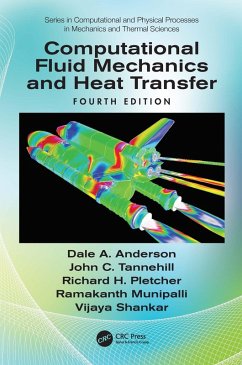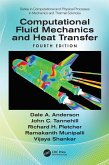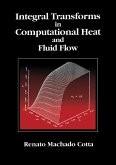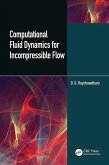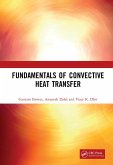Dale Anderson, John C. Tannehill, Richard H. Pletcher, Ramakanth Munipalli, Vijaya Shankar
Computational Fluid Mechanics and Heat Transfer (eBook, PDF)
139,95 €
139,95 €
inkl. MwSt.
Sofort per Download lieferbar

70 °P sammeln
139,95 €
Als Download kaufen

139,95 €
inkl. MwSt.
Sofort per Download lieferbar

70 °P sammeln
Jetzt verschenken
Alle Infos zum eBook verschenken
139,95 €
inkl. MwSt.
Sofort per Download lieferbar
Alle Infos zum eBook verschenken

70 °P sammeln
Dale Anderson, John C. Tannehill, Richard H. Pletcher, Ramakanth Munipalli, Vijaya Shankar
Computational Fluid Mechanics and Heat Transfer (eBook, PDF)
- Format: PDF
- Merkliste
- Auf die Merkliste
- Bewerten Bewerten
- Teilen
- Produkt teilen
- Produkterinnerung
- Produkterinnerung

Bitte loggen Sie sich zunächst in Ihr Kundenkonto ein oder registrieren Sie sich bei
bücher.de, um das eBook-Abo tolino select nutzen zu können.
Hier können Sie sich einloggen
Hier können Sie sich einloggen
Sie sind bereits eingeloggt. Klicken Sie auf 2. tolino select Abo, um fortzufahren.

Bitte loggen Sie sich zunächst in Ihr Kundenkonto ein oder registrieren Sie sich bei bücher.de, um das eBook-Abo tolino select nutzen zu können.
Computational Fluid Mechanics and Heat Transfer, Fourth Edition is a fully updated version of the classic text on finite-difference and finite-volume computational methods.
- Geräte: PC
- ohne Kopierschutz
- eBook Hilfe
- Größe: 31.5MB
Andere Kunden interessierten sich auch für
![Computational Fluid Mechanics and Heat Transfer (eBook, ePUB) Computational Fluid Mechanics and Heat Transfer (eBook, ePUB)]() Dale AndersonComputational Fluid Mechanics and Heat Transfer (eBook, ePUB)139,95 €
Dale AndersonComputational Fluid Mechanics and Heat Transfer (eBook, ePUB)139,95 €![Integral Transforms in Computational Heat and Fluid Flow (eBook, PDF) Integral Transforms in Computational Heat and Fluid Flow (eBook, PDF)]() Renato Machado CottaIntegral Transforms in Computational Heat and Fluid Flow (eBook, PDF)257,95 €
Renato Machado CottaIntegral Transforms in Computational Heat and Fluid Flow (eBook, PDF)257,95 €![Convective Heat Transfer in Porous Media (eBook, PDF) Convective Heat Transfer in Porous Media (eBook, PDF)]() Convective Heat Transfer in Porous Media (eBook, PDF)180,95 €
Convective Heat Transfer in Porous Media (eBook, PDF)180,95 €![Computational Fluid Dynamics for Incompressible Flows (eBook, PDF) Computational Fluid Dynamics for Incompressible Flows (eBook, PDF)]() D. G. RoychowdhuryComputational Fluid Dynamics for Incompressible Flows (eBook, PDF)49,95 €
D. G. RoychowdhuryComputational Fluid Dynamics for Incompressible Flows (eBook, PDF)49,95 €![Finite Analytic Method in Flows and Heat Transfer (eBook, PDF) Finite Analytic Method in Flows and Heat Transfer (eBook, PDF)]() R. A. BernatzFinite Analytic Method in Flows and Heat Transfer (eBook, PDF)79,95 €
R. A. BernatzFinite Analytic Method in Flows and Heat Transfer (eBook, PDF)79,95 €![Radiation Heat Transfer Modelling with Computational Fluid Dynamics (eBook, PDF) Radiation Heat Transfer Modelling with Computational Fluid Dynamics (eBook, PDF)]() Yehuda SinaiRadiation Heat Transfer Modelling with Computational Fluid Dynamics (eBook, PDF)80,95 €
Yehuda SinaiRadiation Heat Transfer Modelling with Computational Fluid Dynamics (eBook, PDF)80,95 €![Fundamentals of Convective Heat Transfer (eBook, PDF) Fundamentals of Convective Heat Transfer (eBook, PDF)]() Gautam BiswasFundamentals of Convective Heat Transfer (eBook, PDF)51,95 €
Gautam BiswasFundamentals of Convective Heat Transfer (eBook, PDF)51,95 €-
-
-
Computational Fluid Mechanics and Heat Transfer, Fourth Edition is a fully updated version of the classic text on finite-difference and finite-volume computational methods.
Dieser Download kann aus rechtlichen Gründen nur mit Rechnungsadresse in A, B, BG, CY, CZ, D, DK, EW, E, FIN, F, GR, HR, H, IRL, I, LT, L, LR, M, NL, PL, P, R, S, SLO, SK ausgeliefert werden.
Produktdetails
- Produktdetails
- Verlag: Taylor & Francis
- Seitenzahl: 974
- Erscheinungstermin: 17. Dezember 2020
- Englisch
- ISBN-13: 9781351124010
- Artikelnr.: 60472980
- Verlag: Taylor & Francis
- Seitenzahl: 974
- Erscheinungstermin: 17. Dezember 2020
- Englisch
- ISBN-13: 9781351124010
- Artikelnr.: 60472980
- Herstellerkennzeichnung Die Herstellerinformationen sind derzeit nicht verfügbar.
Dale A. Anderson received his M.S. and Ph.D. in Aerospace and Electrical Engineering from Iowa State University; he has served as the Dean of Graduate Studies, Vice President for Research and Associate Dean in the College of Engineering at the University of Texas at Arlington, and as Director of the Computational Fluid Dynamics Center at Iowa State University. Dr. Anderson has served as a consultant, and also in full-time positions with McDonnell-Douglas, the Boeing Company, Aerospace Corporation, the U.S. Air Force, FMC Corporation, British Petroleum, Union Carbide, Viskase Corporation, and Lockheed-Martin.
John C. Tannehill received his Ph.D. degrees in Aerospace Engineering and Mechanical Engineering from Iowa State University, where he also served as a professor of Aerospace Engineering and Engineering Mechanics, and as Manager of the Computational Fluid Dynamics Center. Dr. Tannehill has held positions at the NASA Dyden Research Center, Aerospace Corporation, and NASA Ames Research Center, and has served as a technical consultant for several industrial firms. He is the author of numerous technical papers in the area of computational fluid dynamics, and he is a Fellow of the American Institute of Aeronautics and Astronautics.
Richard H. Pletcher received his B.S. degree from Purdue University, and his M.S. and Ph.D. degrees from Cornell University. At Iowa State University he served as a Professor of Mechanical Engineering and Associate Manager of the Computational Fluid Dynamics Center. He was an associate editor of the Journal of Heat Transfer, and a member of the advisory board for Numerical Heat Transfer. Dr. Pletcher passed away in 2015.
Ramakanth Munipalli received his B.Tech from IIT Madras (India), MS and Ph.D. from the University of Texas at Arlington, all in Aerospace Engineering. He is currently a Senior Aerospace Research Engineer at the U.S. Air Force Research Laboratory (Edwards AFB). Previously, he was a Senior Computational Physicist at HyPerComp Inc. in Westlake Village, California. At AFRL, his work is mainly in the application of model reduction and data science techniques to high fidelity CFD in aerospace propulsion. At HyPerComp Inc., he has worked on computational magnetohydrodynamics, simulations of turbulent combustion, and high order accurate solver development. His research was supported by DoE, DoD, and various private companies, and has included extensive collaboration with experts from the academia.
Vijaya Shankar received his M.S. degree and Ph.D. degree (in 1977) both in Aerospace Engineering, from Iowa State University. He joined the Rockwell International Science Center in 1976. At Rockwell, he was responsible for developing multidisciplinary computing technologies involving fluid dynamics, electromagnetics, structures and other related disciplines that are critical for both defense and commercial programs. Dr. Shankar formed HyPerComp, Inc. in 1998 to advance the state of the art in time-domain computational electromagnetic (CEM) using high performance computing parallel architectures for DoD and other customers.
John C. Tannehill received his Ph.D. degrees in Aerospace Engineering and Mechanical Engineering from Iowa State University, where he also served as a professor of Aerospace Engineering and Engineering Mechanics, and as Manager of the Computational Fluid Dynamics Center. Dr. Tannehill has held positions at the NASA Dyden Research Center, Aerospace Corporation, and NASA Ames Research Center, and has served as a technical consultant for several industrial firms. He is the author of numerous technical papers in the area of computational fluid dynamics, and he is a Fellow of the American Institute of Aeronautics and Astronautics.
Richard H. Pletcher received his B.S. degree from Purdue University, and his M.S. and Ph.D. degrees from Cornell University. At Iowa State University he served as a Professor of Mechanical Engineering and Associate Manager of the Computational Fluid Dynamics Center. He was an associate editor of the Journal of Heat Transfer, and a member of the advisory board for Numerical Heat Transfer. Dr. Pletcher passed away in 2015.
Ramakanth Munipalli received his B.Tech from IIT Madras (India), MS and Ph.D. from the University of Texas at Arlington, all in Aerospace Engineering. He is currently a Senior Aerospace Research Engineer at the U.S. Air Force Research Laboratory (Edwards AFB). Previously, he was a Senior Computational Physicist at HyPerComp Inc. in Westlake Village, California. At AFRL, his work is mainly in the application of model reduction and data science techniques to high fidelity CFD in aerospace propulsion. At HyPerComp Inc., he has worked on computational magnetohydrodynamics, simulations of turbulent combustion, and high order accurate solver development. His research was supported by DoE, DoD, and various private companies, and has included extensive collaboration with experts from the academia.
Vijaya Shankar received his M.S. degree and Ph.D. degree (in 1977) both in Aerospace Engineering, from Iowa State University. He joined the Rockwell International Science Center in 1976. At Rockwell, he was responsible for developing multidisciplinary computing technologies involving fluid dynamics, electromagnetics, structures and other related disciplines that are critical for both defense and commercial programs. Dr. Shankar formed HyPerComp, Inc. in 1998 to advance the state of the art in time-domain computational electromagnetic (CEM) using high performance computing parallel architectures for DoD and other customers.
Part I: Fundamentals. 1. Introduction. 2. Partial Differential Equations.
3. Basics of Discretization Methods. 4. Application of Numerical Methods to
Selected Model Equations. Part II: Application of Numerical Methods to the
Equations of Fluid Mechanics and Heat Transfer. 5. Governing Equations of
Fluid Mechanics and Heat Transfer. 6. Numerical Methods for Inviscid Flow
Equations. 7. Numerical Methods for Boundary-Layer-Type Equations. 8.
Numerical Methods for the "Parabolized" Navier-Stokes Equations. 9.
Numerical Methods for the Navier-Stokes Equations. 10. Grid Generation.
3. Basics of Discretization Methods. 4. Application of Numerical Methods to
Selected Model Equations. Part II: Application of Numerical Methods to the
Equations of Fluid Mechanics and Heat Transfer. 5. Governing Equations of
Fluid Mechanics and Heat Transfer. 6. Numerical Methods for Inviscid Flow
Equations. 7. Numerical Methods for Boundary-Layer-Type Equations. 8.
Numerical Methods for the "Parabolized" Navier-Stokes Equations. 9.
Numerical Methods for the Navier-Stokes Equations. 10. Grid Generation.
Part I: Fundamentals. 1. Introduction. 2. Partial Differential Equations.
3. Basics of Discretization Methods. 4. Application of Numerical Methods to
Selected Model Equations. Part II: Application of Numerical Methods to the
Equations of Fluid Mechanics and Heat Transfer. 5. Governing Equations of
Fluid Mechanics and Heat Transfer. 6. Numerical Methods for Inviscid Flow
Equations. 7. Numerical Methods for Boundary-Layer-Type Equations. 8.
Numerical Methods for the "Parabolized" Navier-Stokes Equations. 9.
Numerical Methods for the Navier-Stokes Equations. 10. Grid Generation.
3. Basics of Discretization Methods. 4. Application of Numerical Methods to
Selected Model Equations. Part II: Application of Numerical Methods to the
Equations of Fluid Mechanics and Heat Transfer. 5. Governing Equations of
Fluid Mechanics and Heat Transfer. 6. Numerical Methods for Inviscid Flow
Equations. 7. Numerical Methods for Boundary-Layer-Type Equations. 8.
Numerical Methods for the "Parabolized" Navier-Stokes Equations. 9.
Numerical Methods for the Navier-Stokes Equations. 10. Grid Generation.
